Comprehensive Marketing Plan: Jetstar Airways in the Australian Market
VerifiedAdded on 2023/06/15
|13
|922
|253
Report
AI Summary
This report provides a comprehensive marketing plan analysis for Jetstar Airways, an Australian low-cost airline established in 2004 as a subsidiary of Qantas. It details the company's target market, which includes independent people, low to middle-income individuals, and leisure and business travelers. The report also explores Jetstar's market segmentation strategies, covering geographic, psychographic, demographic, and behavioral aspects. Furthermore, it outlines the marketing strategies related to product, price, place, and promotion, emphasizing the airline's focus on low-fare flights with high-quality services. The conclusion highlights Jetstar's position as a leading low-cost airline and the effectiveness of its marketing strategies in managing competition, referencing various academic sources to support the analysis. Desklib provides students access to similar solved assignments and study resources.

J E T S TA R A I R WAY S , A U S T R A L I A
Marketing Plan
Marketing Plan
Paraphrase This Document
Need a fresh take? Get an instant paraphrase of this document with our AI Paraphraser
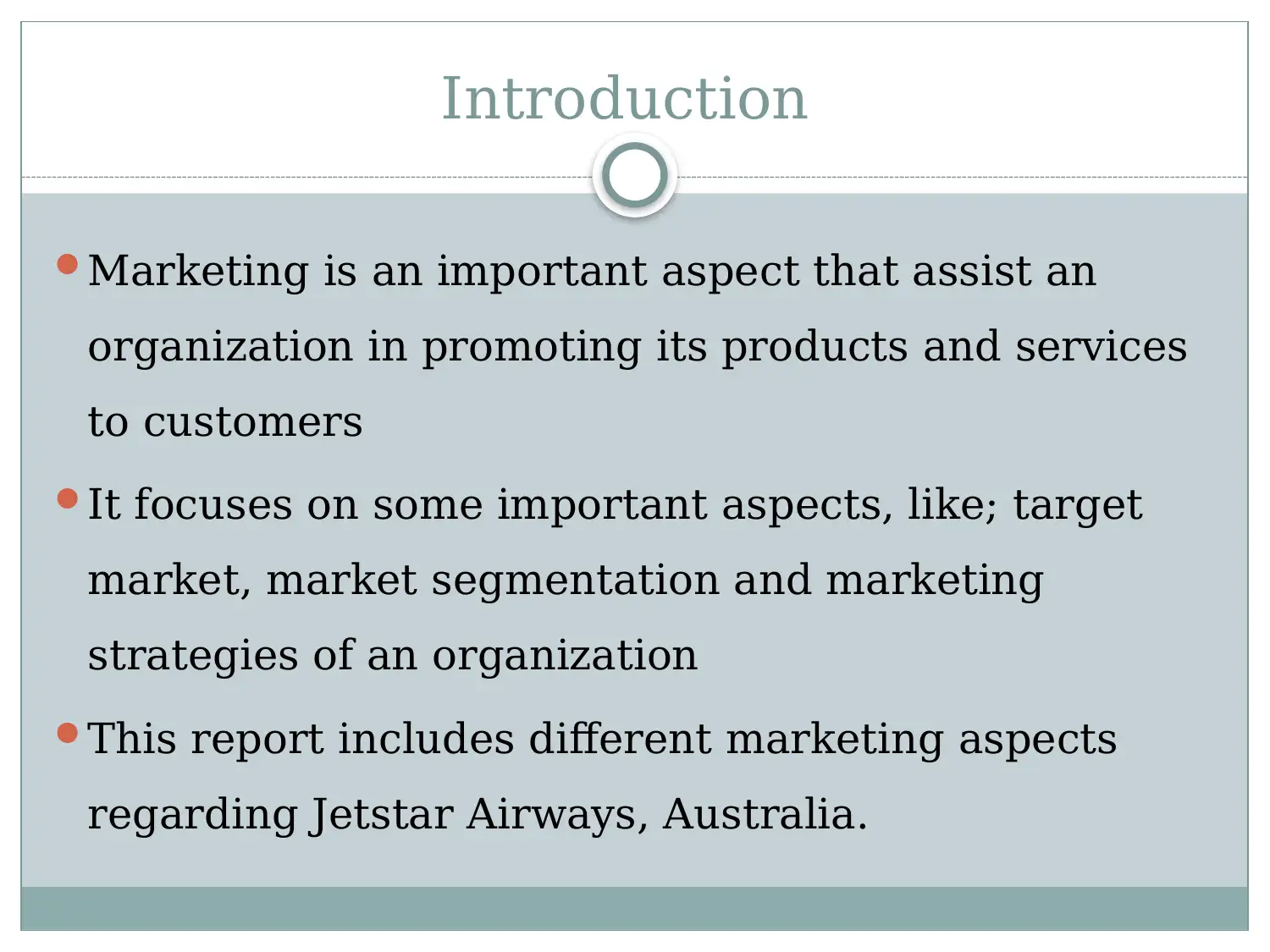
Introduction
Marketing is an important aspect that assist an
organization in promoting its products and services
to customers
It focuses on some important aspects, like; target
market, market segmentation and marketing
strategies of an organization
This report includes different marketing aspects
regarding Jetstar Airways, Australia.
Marketing is an important aspect that assist an
organization in promoting its products and services
to customers
It focuses on some important aspects, like; target
market, market segmentation and marketing
strategies of an organization
This report includes different marketing aspects
regarding Jetstar Airways, Australia.
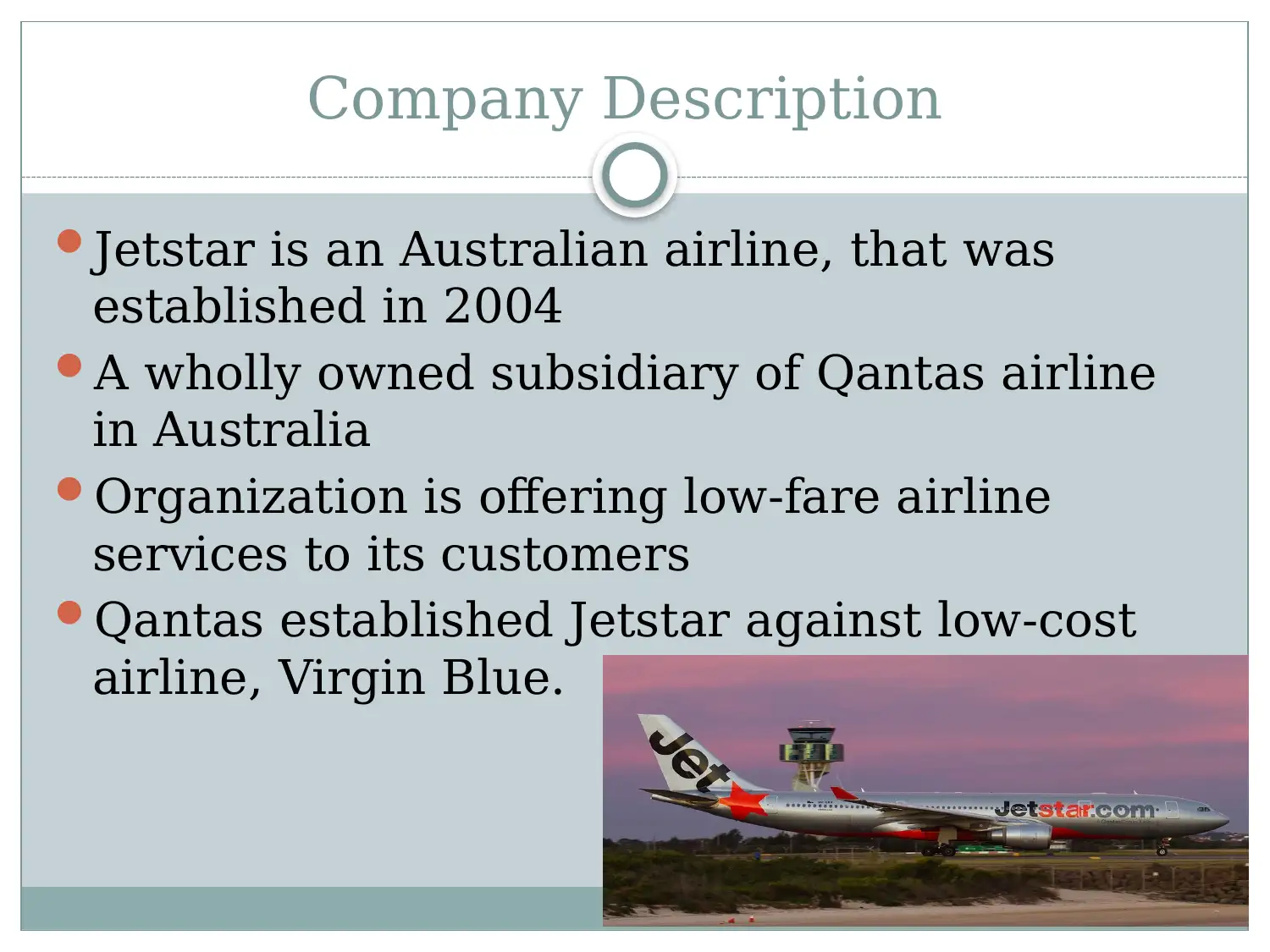
Company Description
Jetstar is an Australian airline, that was
established in 2004
A wholly owned subsidiary of Qantas airline
in Australia
Organization is offering low-fare airline
services to its customers
Qantas established Jetstar against low-cost
airline, Virgin Blue.
Jetstar is an Australian airline, that was
established in 2004
A wholly owned subsidiary of Qantas airline
in Australia
Organization is offering low-fare airline
services to its customers
Qantas established Jetstar against low-cost
airline, Virgin Blue.
⊘ This is a preview!⊘
Do you want full access?
Subscribe today to unlock all pages.

Trusted by 1+ million students worldwide
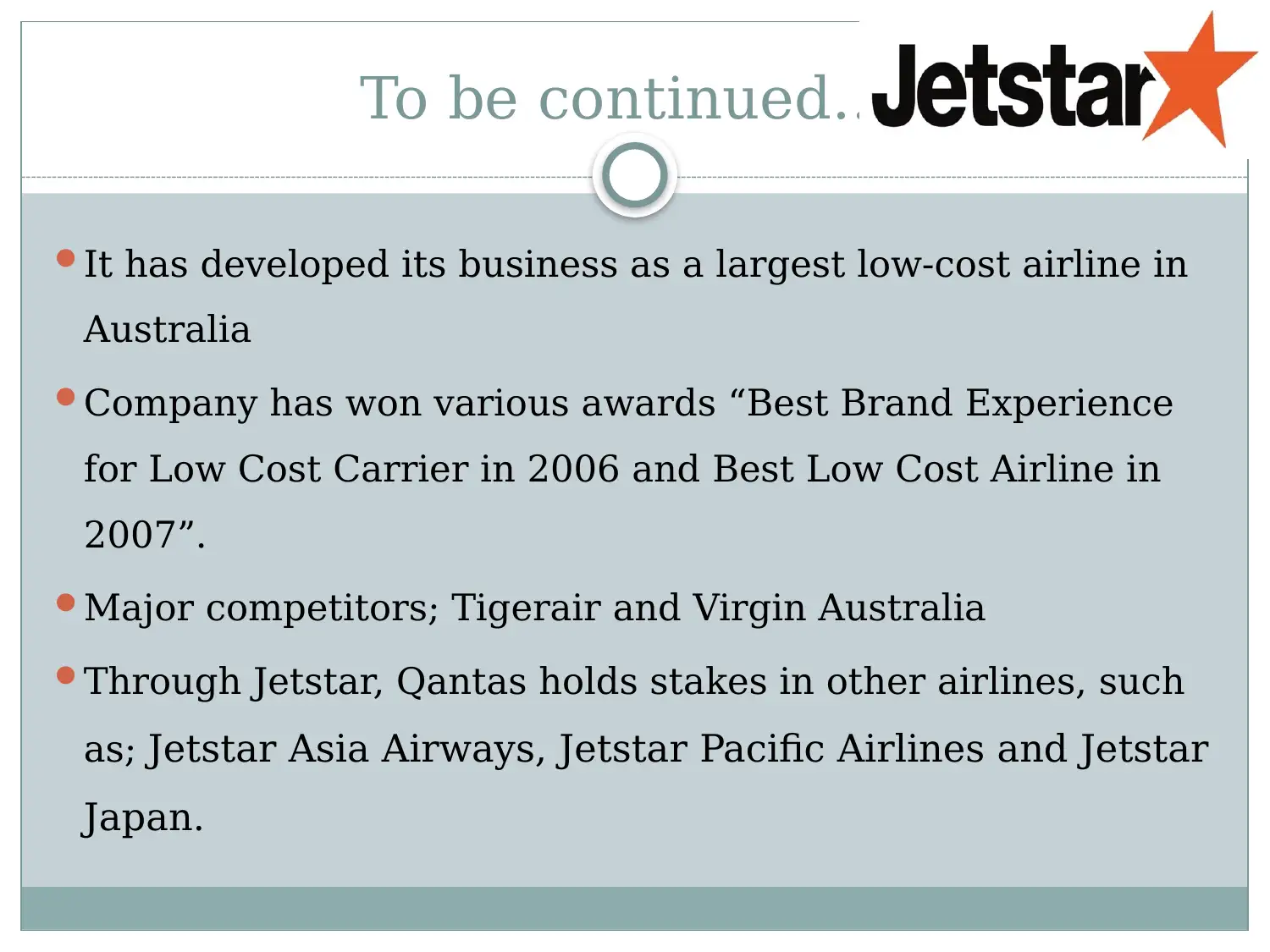
To be continued….
It has developed its business as a largest low-cost airline in
Australia
Company has won various awards “Best Brand Experience
for Low Cost Carrier in 2006 and Best Low Cost Airline in
2007”.
Major competitors; Tigerair and Virgin Australia
Through Jetstar, Qantas holds stakes in other airlines, such
as; Jetstar Asia Airways, Jetstar Pacific Airlines and Jetstar
Japan.
It has developed its business as a largest low-cost airline in
Australia
Company has won various awards “Best Brand Experience
for Low Cost Carrier in 2006 and Best Low Cost Airline in
2007”.
Major competitors; Tigerair and Virgin Australia
Through Jetstar, Qantas holds stakes in other airlines, such
as; Jetstar Asia Airways, Jetstar Pacific Airlines and Jetstar
Japan.
Paraphrase This Document
Need a fresh take? Get an instant paraphrase of this document with our AI Paraphraser
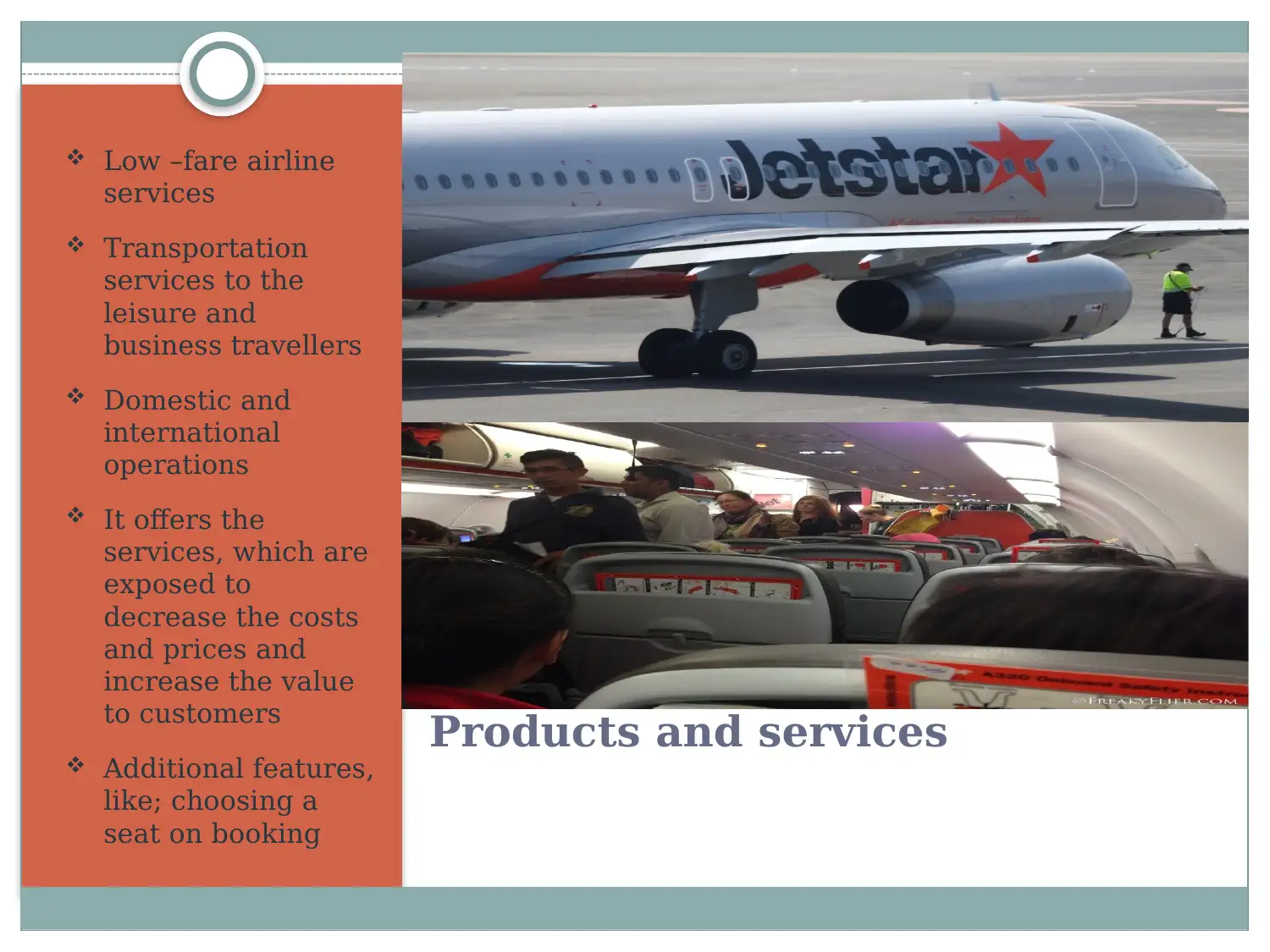
Products and services
Low –fare airline
services
Transportation
services to the
leisure and
business travellers
Domestic and
international
operations
It offers the
services, which are
exposed to
decrease the costs
and prices and
increase the value
to customers
Additional features,
like; choosing a
seat on booking
Low –fare airline
services
Transportation
services to the
leisure and
business travellers
Domestic and
international
operations
It offers the
services, which are
exposed to
decrease the costs
and prices and
increase the value
to customers
Additional features,
like; choosing a
seat on booking
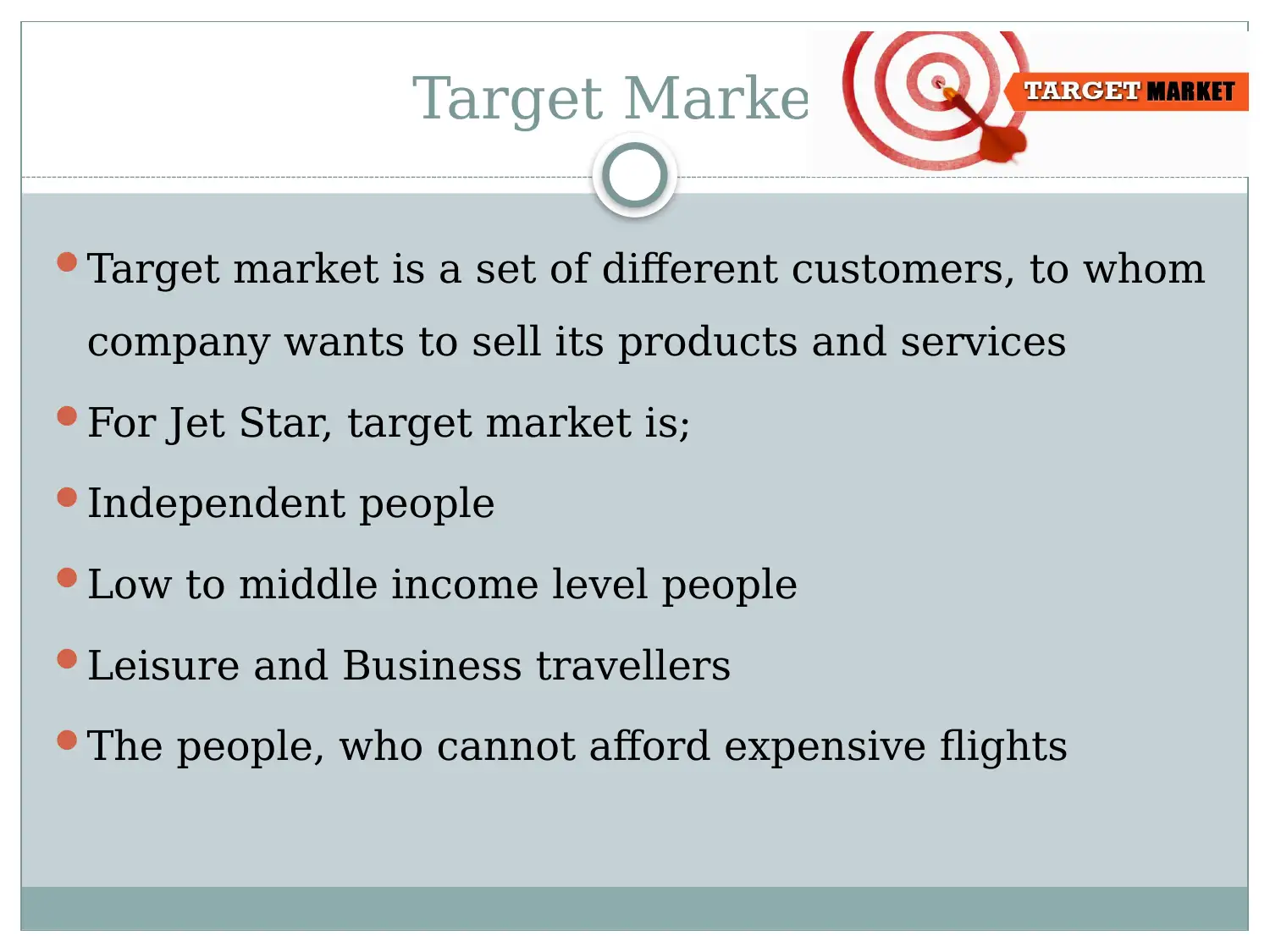
Target Market
Target market is a set of different customers, to whom
company wants to sell its products and services
For Jet Star, target market is;
Independent people
Low to middle income level people
Leisure and Business travellers
The people, who cannot afford expensive flights
Target market is a set of different customers, to whom
company wants to sell its products and services
For Jet Star, target market is;
Independent people
Low to middle income level people
Leisure and Business travellers
The people, who cannot afford expensive flights
⊘ This is a preview!⊘
Do you want full access?
Subscribe today to unlock all pages.

Trusted by 1+ million students worldwide
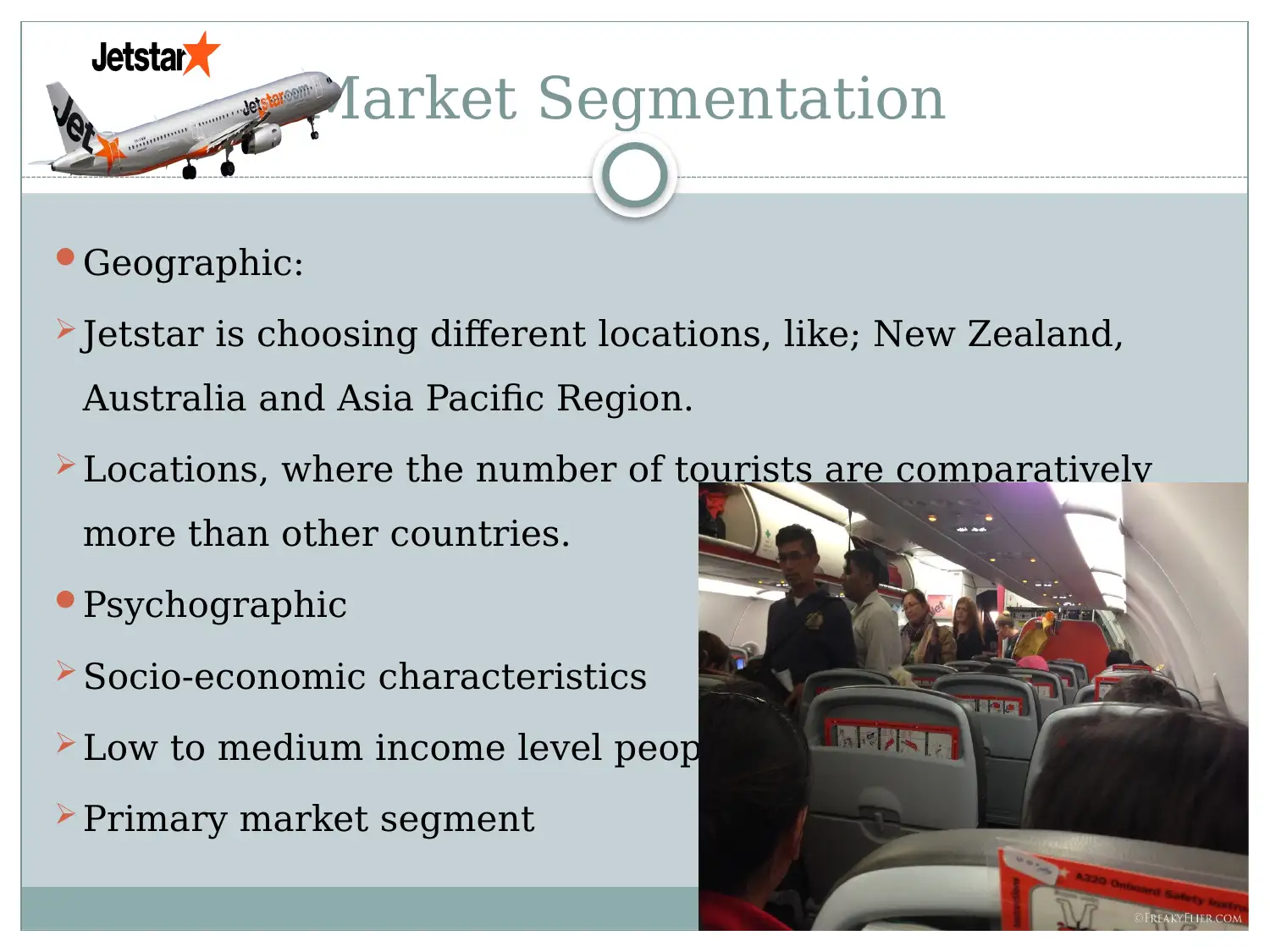
Market Segmentation
Geographic:
Jetstar is choosing different locations, like; New Zealand,
Australia and Asia Pacific Region.
Locations, where the number of tourists are comparatively
more than other countries.
Psychographic
Socio-economic characteristics
Low to medium income level people
Primary market segment
Geographic:
Jetstar is choosing different locations, like; New Zealand,
Australia and Asia Pacific Region.
Locations, where the number of tourists are comparatively
more than other countries.
Psychographic
Socio-economic characteristics
Low to medium income level people
Primary market segment
Paraphrase This Document
Need a fresh take? Get an instant paraphrase of this document with our AI Paraphraser
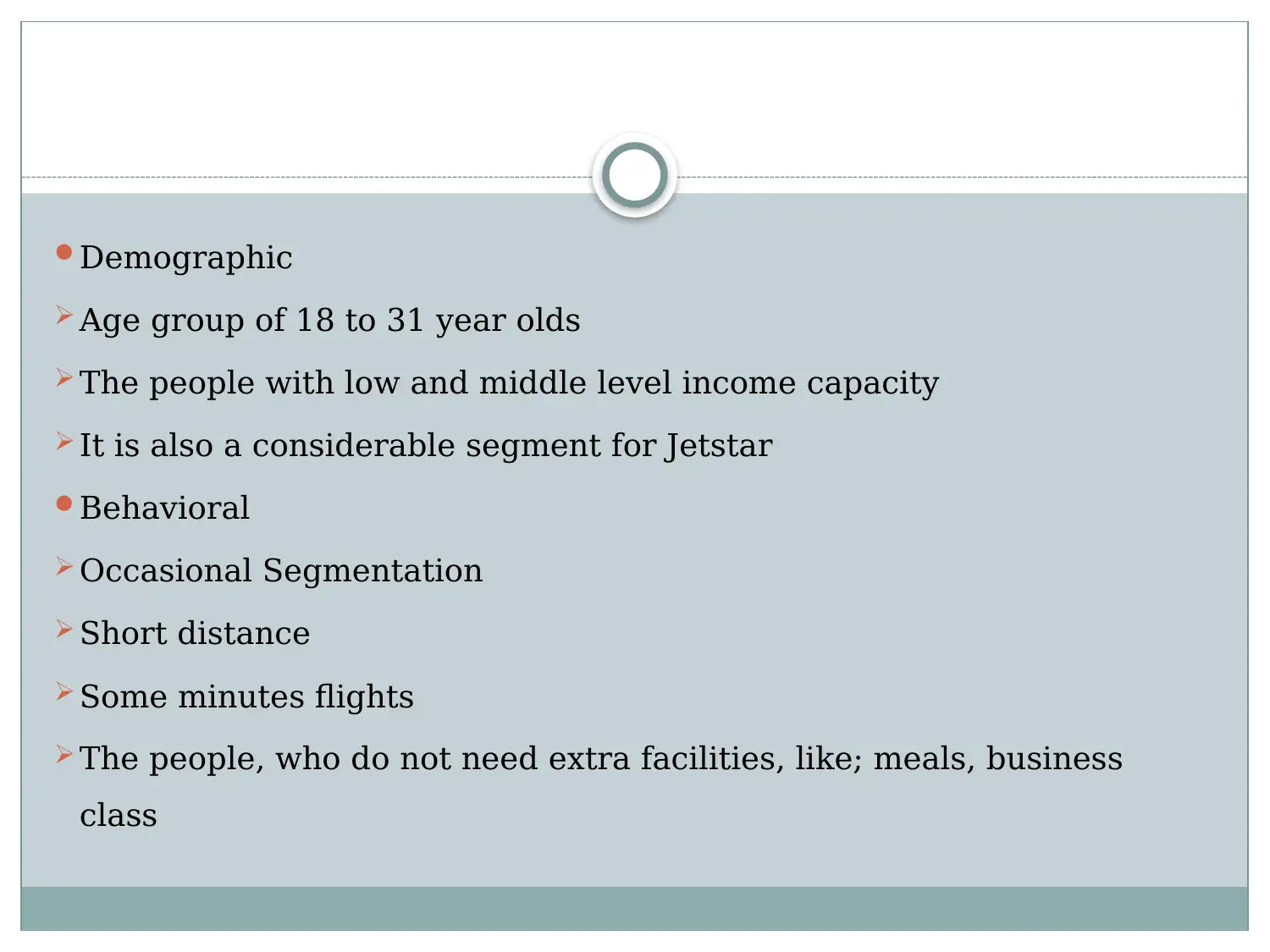
Demographic
Age group of 18 to 31 year olds
The people with low and middle level income capacity
It is also a considerable segment for Jetstar
Behavioral
Occasional Segmentation
Short distance
Some minutes flights
The people, who do not need extra facilities, like; meals, business
class
Age group of 18 to 31 year olds
The people with low and middle level income capacity
It is also a considerable segment for Jetstar
Behavioral
Occasional Segmentation
Short distance
Some minutes flights
The people, who do not need extra facilities, like; meals, business
class
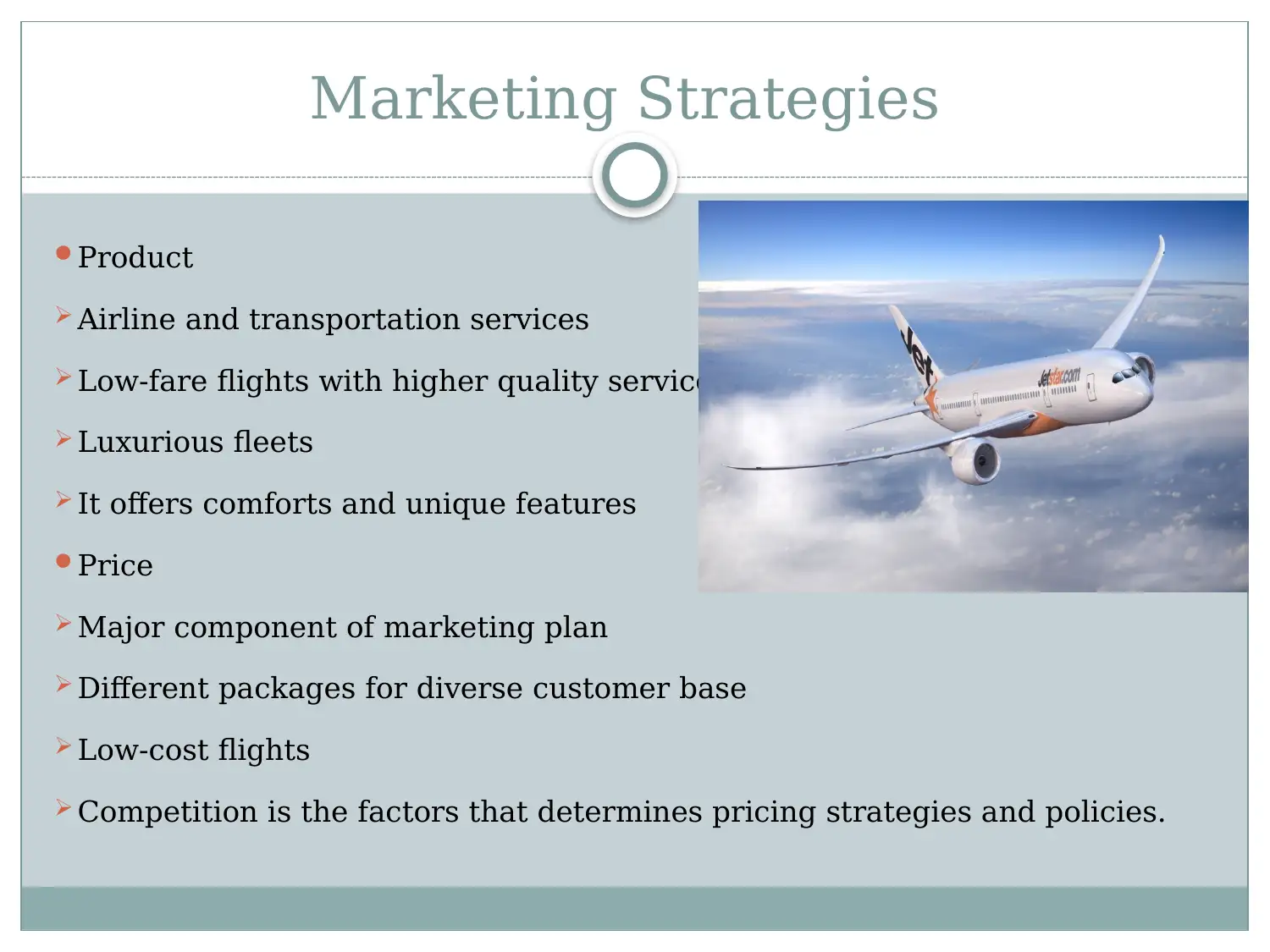
Marketing Strategies
Product
Airline and transportation services
Low-fare flights with higher quality services
Luxurious fleets
It offers comforts and unique features
Price
Major component of marketing plan
Different packages for diverse customer base
Low-cost flights
Competition is the factors that determines pricing strategies and policies.
Product
Airline and transportation services
Low-fare flights with higher quality services
Luxurious fleets
It offers comforts and unique features
Price
Major component of marketing plan
Different packages for diverse customer base
Low-cost flights
Competition is the factors that determines pricing strategies and policies.
⊘ This is a preview!⊘
Do you want full access?
Subscribe today to unlock all pages.

Trusted by 1+ million students worldwide
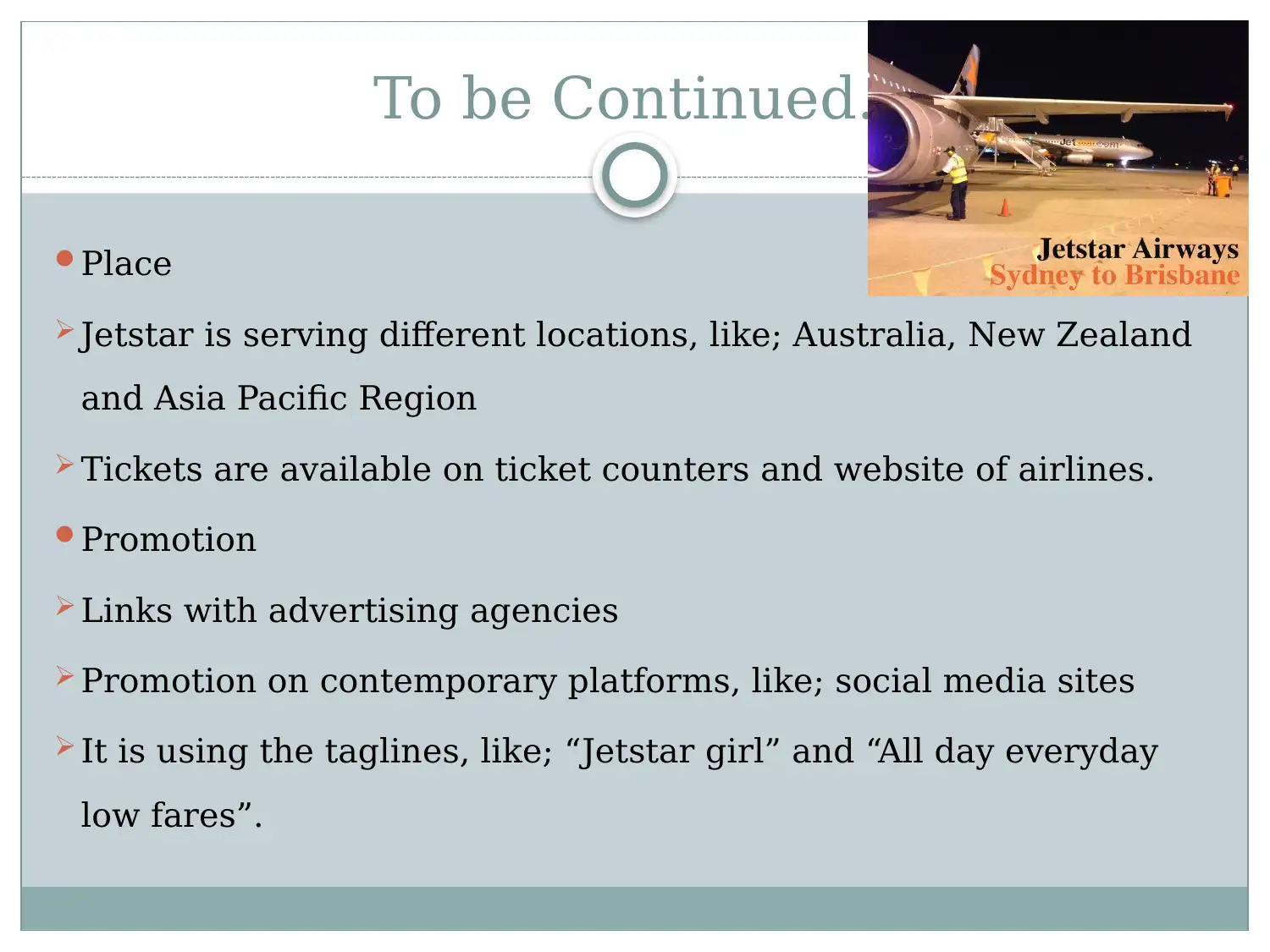
To be Continued..
Place
Jetstar is serving different locations, like; Australia, New Zealand
and Asia Pacific Region
Tickets are available on ticket counters and website of airlines.
Promotion
Links with advertising agencies
Promotion on contemporary platforms, like; social media sites
It is using the taglines, like; “Jetstar girl” and “All day everyday
low fares”.
Place
Jetstar is serving different locations, like; Australia, New Zealand
and Asia Pacific Region
Tickets are available on ticket counters and website of airlines.
Promotion
Links with advertising agencies
Promotion on contemporary platforms, like; social media sites
It is using the taglines, like; “Jetstar girl” and “All day everyday
low fares”.
Paraphrase This Document
Need a fresh take? Get an instant paraphrase of this document with our AI Paraphraser
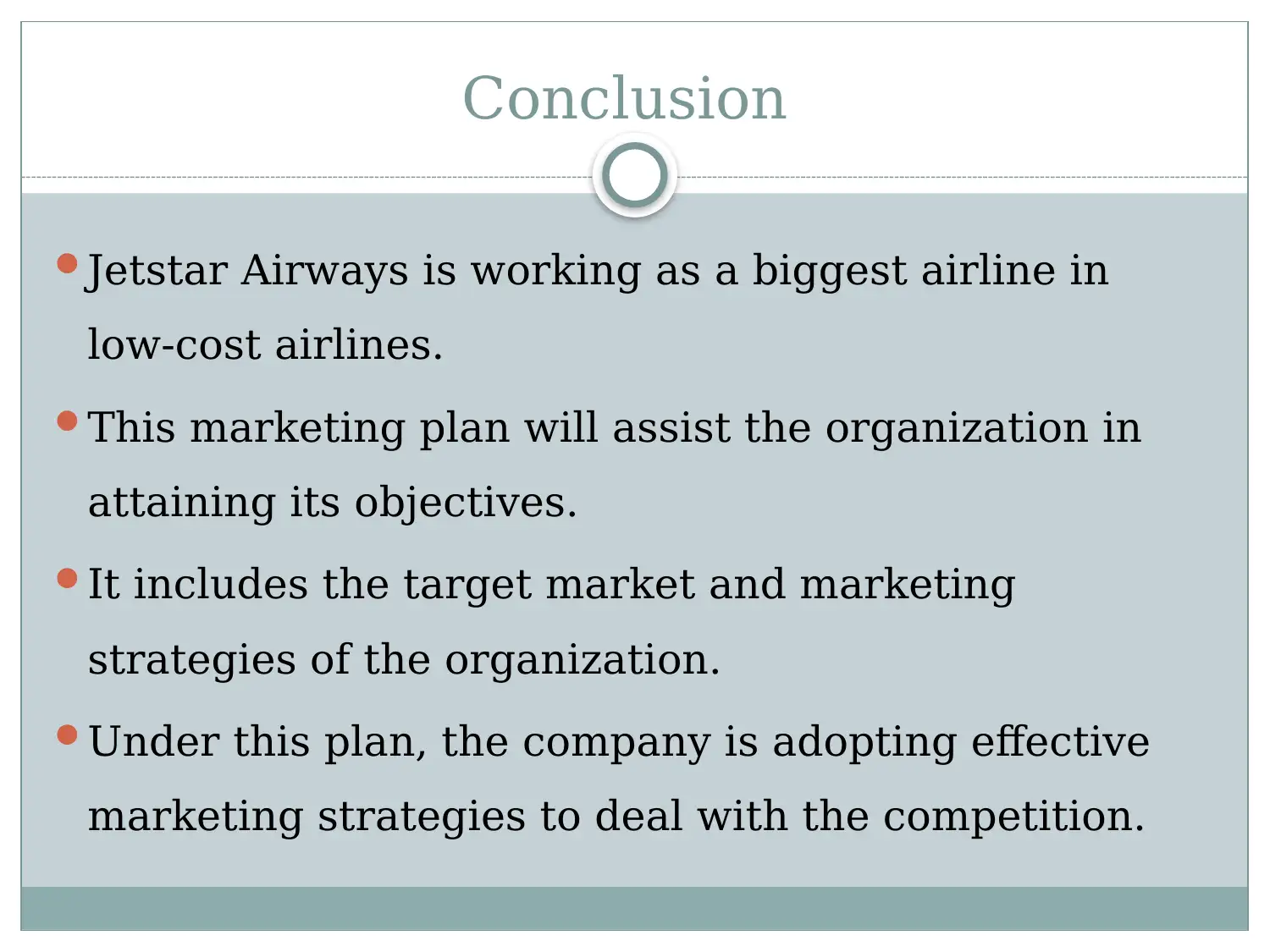
Conclusion
Jetstar Airways is working as a biggest airline in
low-cost airlines.
This marketing plan will assist the organization in
attaining its objectives.
It includes the target market and marketing
strategies of the organization.
Under this plan, the company is adopting effective
marketing strategies to deal with the competition.
Jetstar Airways is working as a biggest airline in
low-cost airlines.
This marketing plan will assist the organization in
attaining its objectives.
It includes the target market and marketing
strategies of the organization.
Under this plan, the company is adopting effective
marketing strategies to deal with the competition.
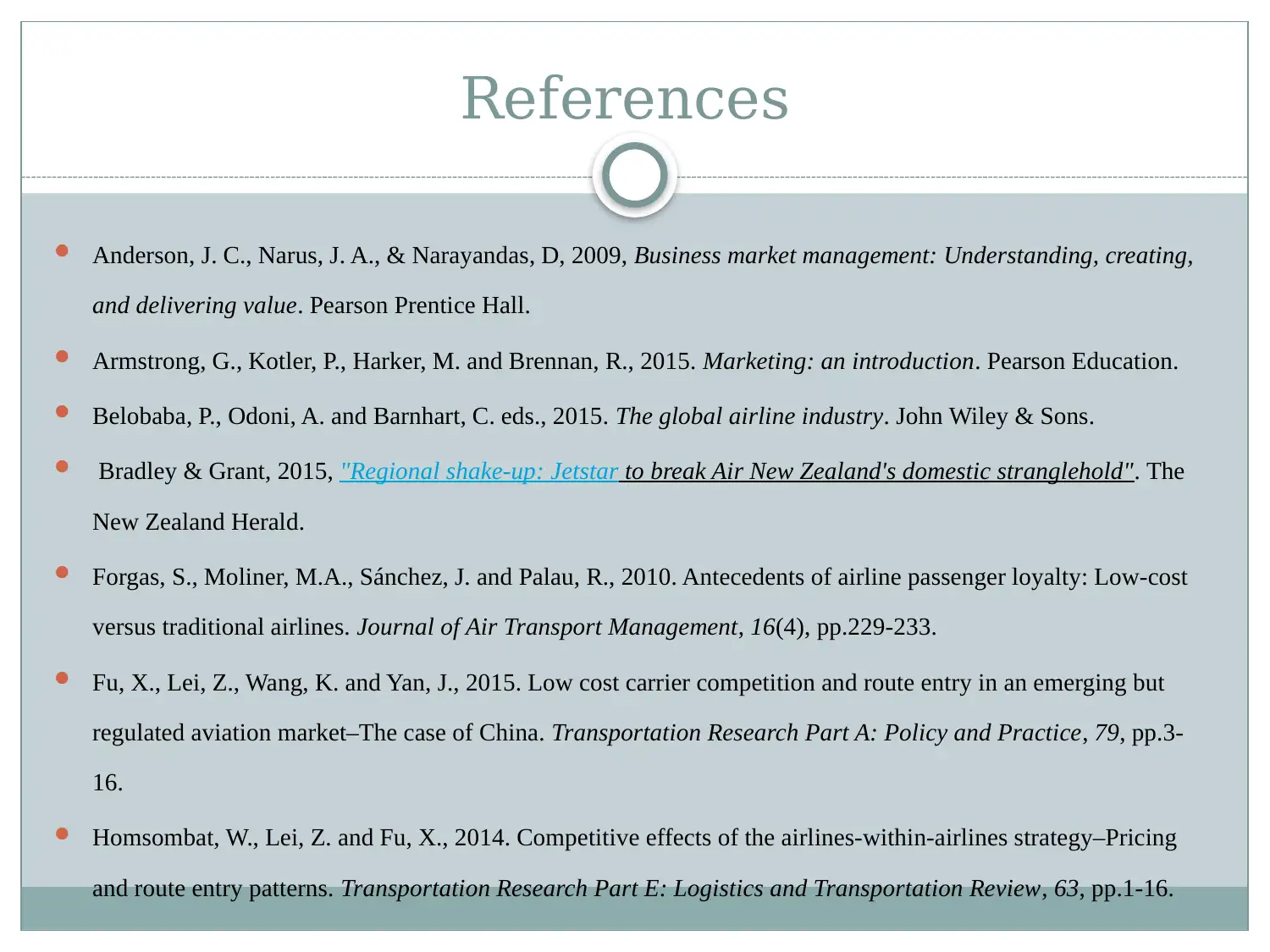
References
Anderson, J. C., Narus, J. A., & Narayandas, D, 2009, Business market management: Understanding, creating,
and delivering value. Pearson Prentice Hall.
Armstrong, G., Kotler, P., Harker, M. and Brennan, R., 2015. Marketing: an introduction. Pearson Education.
Belobaba, P., Odoni, A. and Barnhart, C. eds., 2015. The global airline industry. John Wiley & Sons.
Bradley & Grant, 2015, "Regional shake-up: Jetstar to break Air New Zealand's domestic stranglehold". The
New Zealand Herald.
Forgas, S., Moliner, M.A., Sánchez, J. and Palau, R., 2010. Antecedents of airline passenger loyalty: Low-cost
versus traditional airlines. Journal of Air Transport Management, 16(4), pp.229-233.
Fu, X., Lei, Z., Wang, K. and Yan, J., 2015. Low cost carrier competition and route entry in an emerging but
regulated aviation market–The case of China. Transportation Research Part A: Policy and Practice, 79, pp.3-
16.
Homsombat, W., Lei, Z. and Fu, X., 2014. Competitive effects of the airlines-within-airlines strategy–Pricing
and route entry patterns. Transportation Research Part E: Logistics and Transportation Review, 63, pp.1-16.
Anderson, J. C., Narus, J. A., & Narayandas, D, 2009, Business market management: Understanding, creating,
and delivering value. Pearson Prentice Hall.
Armstrong, G., Kotler, P., Harker, M. and Brennan, R., 2015. Marketing: an introduction. Pearson Education.
Belobaba, P., Odoni, A. and Barnhart, C. eds., 2015. The global airline industry. John Wiley & Sons.
Bradley & Grant, 2015, "Regional shake-up: Jetstar to break Air New Zealand's domestic stranglehold". The
New Zealand Herald.
Forgas, S., Moliner, M.A., Sánchez, J. and Palau, R., 2010. Antecedents of airline passenger loyalty: Low-cost
versus traditional airlines. Journal of Air Transport Management, 16(4), pp.229-233.
Fu, X., Lei, Z., Wang, K. and Yan, J., 2015. Low cost carrier competition and route entry in an emerging but
regulated aviation market–The case of China. Transportation Research Part A: Policy and Practice, 79, pp.3-
16.
Homsombat, W., Lei, Z. and Fu, X., 2014. Competitive effects of the airlines-within-airlines strategy–Pricing
and route entry patterns. Transportation Research Part E: Logistics and Transportation Review, 63, pp.1-16.
⊘ This is a preview!⊘
Do you want full access?
Subscribe today to unlock all pages.

Trusted by 1+ million students worldwide
1 out of 13
Related Documents
Your All-in-One AI-Powered Toolkit for Academic Success.
+13062052269
info@desklib.com
Available 24*7 on WhatsApp / Email
![[object Object]](/_next/static/media/star-bottom.7253800d.svg)
Unlock your academic potential
Copyright © 2020–2026 A2Z Services. All Rights Reserved. Developed and managed by ZUCOL.





